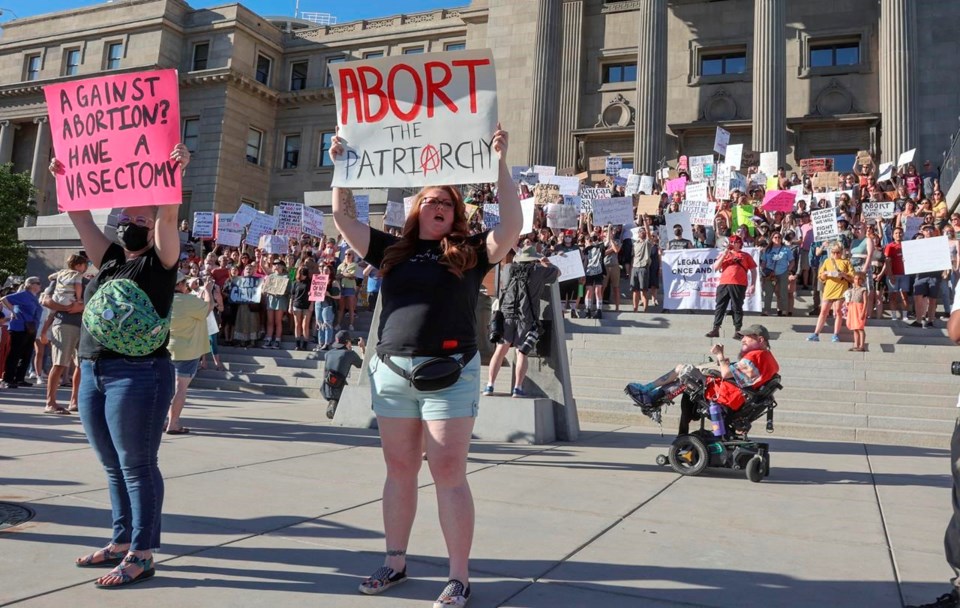A rural hospital in northern Idaho will stop delivering babies or providing other obstetrical care, citing a shifting legal climate in which recently enacted state laws could subject physicians to prosecution for providing abortions, among other reasons.
Bonner General Health in Sandpoint will discontinue obstetrical services in mid-May. It also cited a decreasing number of deliveries and a loss of doctors among other factors in its decision.
Those pregnant in the city of about 9,000 — with an average annual snowfall of about 60 inches (150 centimeters) — will most likely have to travel about 45 miles (70 kilometers) to Coeur d’Alene for care, or to hospitals farther away in Idaho, Washington and Montana.
The decision to discontinue providing obstetrical services was emotional and difficult, hospital officials said in a news release.
“We have made every effort to avoid eliminating these services,” Ford Elsaesser, Bonner General Health’s Board president, said in the release. “We hoped to be the exception, but our challenges are impossible to overcome now.”
The numbers of deliveries had been declining for years with 265 births recorded at the hospital in 2022, the statement said. Births also have been decreasing nationally and older people have been moving into the Sandpoint area, officials said.
Hospital officials said Idaho’s legal and political climate was partly to blame.
After the United States Supreme Court stripped away constitutional protections for abortion last year, Idaho banned nearly all abortions in measures that subject physicians to prosecution for providing any abortions, even if needed to protect the health of a pregnant patient.
“The Idaho Legislature continues to introduce and pass bills that criminalize physicians for medical care nationally recognized as the standard of care,” the hospital statement said. “Consequences for Idaho physicians providing the standard of care may include civil litigation and criminal prosecution, leading to jail time or fines.”
Physicians could face felony charges and a medical license revocation for violating the law, which the Idaho Supreme Court determined earlier this year is constitutional. A federal judge has stopped Idaho from enforcing the ban in medical emergencies at Medicare-funded facilities.
Highly respected, talented physicians are leaving, according to Bonner hospital officials, who said recruiting replacements would be extraordinarily difficult.
Dr. Amelia Huntsberger, an obstetrician-gynecologist at Bonner General Hospital, moved to Sandpoint in 2012 to work in the area, according to a court filing last year supporting an effort to halt the abortion ban.
She told the Idaho Capital Sun in Boise by email that she will leave the hospital and the state because of the abortion laws and because of the Idaho Legislature’s decision to discontinue the state’s maternal mortality review committee.
“For rural patients in particular, delaying medical care until we can say an abortion is necessary to prevent death is dangerous,” she said in her court filing. “Patients will suffer pain, complications, and could die if physicians comply with Idaho law as written.”
Huntsberger could not be reached for comment by The Associated Press and messages left for her with a hospital spokeswoman were not returned.
Leandra Wright told KREM-TV that after having a baby at Bonner General Health in 2020 she had been looking forward to the birth of her son there in August.
Wright, who lives in the nearby town of Sagle, said she learned about the hospital's decision from a Facebook post.
“It’s nerve-wracking and stressful and my stomach just kind of drops,” Wright said. “Now I have to reestablish with another place and I have to drive to have my baby.”
Officials at Kootenai Health in Coeur d'Alene said in a Facebook post that anyone who would have given birth at Bonner General Health can go to Kootenai Health's Family Birth Center, where about 2,200 babies are born each year.
“Leadership from both hospitals are working together to identify any barriers to care for the patient population affected by this closure and are creating solutions to ensure a quality birth experience,” the post said.
___
Associated Press writer Claire Rush in Portland, Oregon, contributed to this report.
Lisa Baumann, The Associated Press



